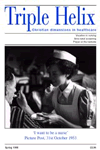When asked to review a book dealing with psychology and Christianity I confess I groaned inwardly at the thought, not because the subject isn't important but because so many writers have attempted this in the past and produced works which are sadly inadequate.
Christian critiques of psychology have frequently been well intended but have lacked an adequate understanding of what psychology is. Similarly, those psychologists who have commented on matters religious have often done so as outsiders who do not necessarily understand the essential Christian message. This book, I am pleased to say, is different. The author is an eminent psychologist who well understands both his discipline and the teachings of the Christian faith.
The work is serious, scholarly and at times challenging. Jeeves addresses issues such as personology, the nature of consciousness and the relationship between brain and mind, drawing extensively on both psychological research and the Bible. It is not an easy read but one which those who are interested in these questions will find rewarding.
The author's emphasis on questions related to neuropsychology no doubt reflects his own academic interest. (He is a former President of the International Neuropsychological Symposium.) While this adds to the depth and scholarship of the work, it can at times leave the practitioner feeling that something is missing. Jeeves' discussion of homosexuality, for example, points out that sexual victimisation of children by adult homosexuals or others is not a factor in the development of a homosexual orientation. This conclusion is well supported by the research evidence, but those of us in clinical or counselling work know only too well the doubts and fears about their sexual orientation that victims of abuse often suffer. His criticism of the 'gay gene' hypothesis and defence of heterosexual monogamy as the only legitimate 'one flesh' experience make more satisfying reading.
In short, this is a timely and helpful text, if a somewhat academic one. It should prove useful to students, teachers and anyone who enjoys having their neurones engaged.
Reviewed by
John Steley
(Psychologist, London)































